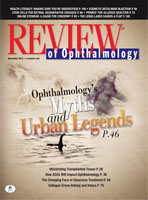To the Editor:
I absolutely loved your article on “myths.” (“
Common Wisdom: Science or Myth?” November 2012) I loved it for several reasons. First of all, I thought it was courageous of you even to suggest that a significant portion of physician behavior is based on poor evidence. Every time I hear about the importance of “evidence-based medicine,” I want to scream, because as it is used it is virtually always self-adulatory. I don’t see that physicians are any more interested in evidence now than they ever have been in the history of mankind. They just want to use evidence that they like, and that they find confirms their own biases. The examples you gave were interesting and appropriate.
 |
Examples of systematic bias include the following: When in doubt whether to treat or not, treat! If a finding is “within normal limits,” that’s good. People with the same diagnosis. “The doctor knows best.” The more tests the better. Physicians are more altruistic and freer from bias than other people. And, dishonesty is okay as long as the physician believes that the reason he or she is being dishonest is because it is in the best interest of the patient.
These phrases describe the way physicians act. There is as much or more evidence indicating these beliefs are incorrect as there is that they are valid.
The items that you list in your article are not truly myths. They are unsubstantiated opinions. A myth is a belief that drives fundamental aspects of behavior. Many myths are fervently believed by many people, such as the idea that God created the world over a period of seven days and that if you die in battle (and are on the right side) you go immediately to Valhalla, the warriors’ heaven. A scientific definition of a myth could be a systematic bias. I am grateful to Dr. Frankel for making me aware of my systematic biases. Now, if only I could figure out which ones are valid!?
Sincerely,
George Spaeth, MD
Louis J. Esposito Research Professor
Wills Eye Institute
Philadelphia
To the Editor:
Now we no longer can access commercial preservative-free (free of sodium bisulfite) intraocular epinephrine. In recent years, we have been plagued by shortages of other pharmaceuticals.
I do not see any sign that our representatives of organized medicine or ophthalmology are explaining this problem, let alone addressing and helping to solve this problem.
I am as much a conspiracy buff as the next person, but I do not see any benefit to anyone if something is not being sold. I do not think anyone gains anything; I doubt that the compounding pharmacies are conspiring so that the commercial manufacturers will suddenly, and inexplicably, have epinephrine on back order.
These shortages are challenging our ability to provide optimal patient care. They’re episodic and recurrent, and affect all categories of medications. Perhaps one of the major ophthalmic drug companies will undertake to manufacture a menu of these items, in the interest of doctor loyalty and patient safety.
Yours sincerely,
Samuel M. Salamon, MD
Euclid, Ohio



